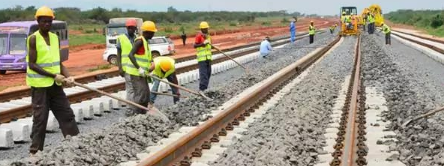Parliament has approved a government request to borrow Euros 216.7 million from the African Development Fund (ADF), Euros84.41 million from the African Development Bank (ADB) and Euros25.9 million from the Corporate Internalisation Fund of Spain.
The loan monies totaling to approximately shs1.4 trillion will facilitate the refurbishment of the Kampala-Malaba Metre Gauge Railway Project.
According to a report by the Parliament Committee on National Economy presented by the Chairperson, Hon. Syda Bbumba, the Rift Valley Railways (RVR) that had been contracted to manage the railway left a totally dilapidated entity with the assets they took over in very good condition, no longer operable.
Uganda terminated RVR operations on 25 January 2018 along with Kenya, after the company failed to meet agreed benchmarks, which has made Uganda Railways Corporation (URC) struggle in meeting the demand of bulk cargo clients due to lack of reliable railway lines and poor wagons.
Bbumba told the House sitting on Tuesday, 11 May 2021 that government proposed the Metre Gauge Railways project that will entail rehabilitation of the line from Malaba-Kampala (250 kilometres), Kampala-Port Bell (8.3 kilometres) and Kampala-Nalukolongo-Kyengera (12.3 kilometres); totaling to 270.6 kilometres of coverage.
She added that government also had plans to purchase and rehabilitate coaches, wagons and locomotives, create a railway training school to equip URC management and staff with modern railway management skills and stock spare parts.
“If the Metre Gauge Railway project is implemented, the cost of transport by rail will improve from the current average of between US$0.09 – $0.13 per NTK-net ton kilometre, to $0.05, hence reducing the cost of doing business,” said Syda Bbumba.
According to the committee report, implementation of the Metre Gauge Railway will improve commuters’ travel time within a 12 kilometre distance from two hours to 20 minutes, and the cargo per month will improve from 20,000 tons to 300,000 tons per month.
The Committee on National Economy recommended that the URC should evaluate the possibility of using the army to deliver some of the project outputs with a view of reducing the cost of rehabilitating the Metre Gauge Railway.
“The committee observed that the army brigade has been used to support the construction of some projects and where they have been used, the costs have been cheaper than the market costs,” said Bbumba.
Although MPs noted that Uganda was landlocked and thus needed railway services, they questioned why government had been slow in executing the Standard Gauge Railway Project and now wanted to borrow funds to facilitate the Metre Gauge Railway project.
“This project has been long overdue since the old railway stations are now dilapidated, but why are we opting for a metre gauge railway when our neighbouring countries in the region are setting up standard gauges?” asked Hon. Violet Akurut (NRM, Katakwi).
“The loan is good but its purpose is going to crush the dreams of the people of Tororo who have been looking forward to the Standard Gauge Railway which they expected to improve their business opportunities,” said Hon. Richard Okoth Othieno (NRM, West Budama County North)
Kalungu County West MP, Hon. Joseph Ssewungu, declined to support the loan request saying that it would increase Uganda’s debt burden, adding that if the country had a financial card like is the case in banks, it would have been barred from borrowing further.
The Minister of State for Finance, Hon. David Bahati, told the House that the country’s debt burden was not alarming and was still one of the best in the region, and assured MPs that the Standard Gauge Railway project was still on-course; owing to consultations with China for the project to kick off in the next two years.
Hon. Joseph Ssewungu, declined to support the loan request saying that it would increase the country’s debt burden
State Minister for Minerals, Hon. Peter Lokeris, told legislators that neighboring countries had played their part but Uganda was lagging behind.


